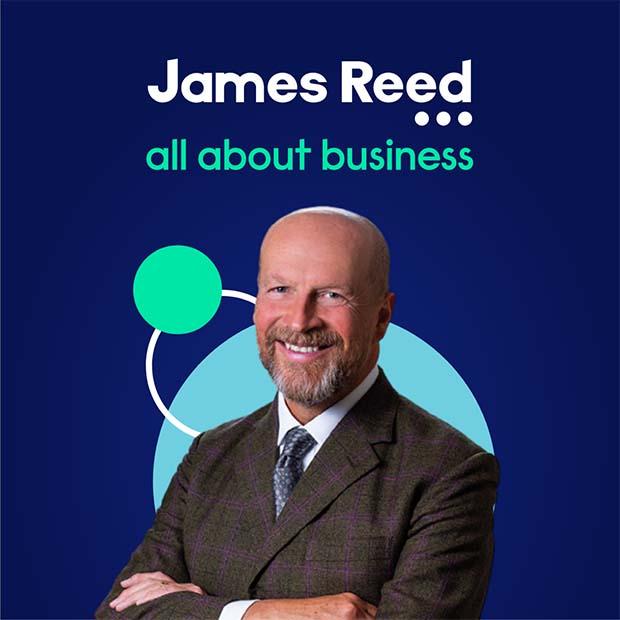Reed’s research has confirmed a 17% decline in job postings in the first half of 2023 and 29% rise in job applications – a sure sign the balance of power is shifting back towards employers in line with pre-pandemic times. This may heighten competition for sought-after roles, and impact salary negotiations and remote working arrangements – but employers must maintain flexibility to retain valued staff.
Watch the short video interview with our Chairman and CEO James Reed, or read the full interview below:

Q: Reed data shows a 17% decline in job postings in the first half of 2023 and a 29% rise in job applications. What do you think has led to such a dramatic turnaround from the candidate-led market?
A: The labour market is always changing and evolving, but this year, in 2023, it’s noticeably moved on.
And the most important difference between this year and the last two years preceding is that the jobs boom that came out of the pandemic is now over.
The jobs boom that lasted pretty much two years has ended, and a new market is emerging. So, if you like, the tide has turned – that’s how I would characterise it. The tide has turned, and what had been an incredibly strong market for candidates is now much more moving in employers’ favour - in terms of the balance of power in the labour market.
But I don't believe there needs to be winners and losers in the labour market. I think it's possible for everyone to benefit and do well.
And I think a reassuring thing about the current environment, is there are still a lot of jobs - a million vacancies is still a huge number of vacancies in the economy. So, there are a lot of opportunities for candidates. Having said that, there are fewer jobs than there were, and there are more people looking - this is the other big change.
We’ve seen the number of people coming to our website Reed.co.uk go up, as just been mentioned, multiples of percentage points. So, the opportunities for people are still there, but there's more competition for them is how I would characterise it.
And if you're an employer, you probably have a little bit more bargaining power than you did a year ago.
Q: How do you think the change will impact employers and jobseekers?
A: Well, from an employer point of view, it still feels like a tight labour market, and in many ways it is. It's still difficult to source people, there's still scarcity of skills in many sectors.
But I would say that’s likely to soften over the next few months, and employers will find it easier to recruit people. And indeed, this is a good time to do that. It might be that the UK economy is in a recession or heading for a recession. It certainly feels like recessionary conditions in the labour market at the moment, and that always suggests to me this is a good time to look for people, to hire people.
And, if you're looking for work, if you're a candidate, a jobseeker, I think it's very important to prioritise your skills, and to continue to develop your skills, if you can, using all the various tools that are available. There are some incredible offerings, many of which are free online, where you can learn new skills, or supplement your skills. This is a good time to invest in yourself and to develop your CV perhaps before you send it out and compete for jobs.
Q: Are there any sectors in which this employer-driven market does not apply? And what are the reasons for this?
A: Well, two sectors that have been consistently strong, both during the jobs boom, post-pandemic, and now, are education and energy.
There's a great shortage of teachers and also teaching support staff in the education sector. So, education is a great area to work in. Teachers are heroes, in my opinion, and that is a great area to consider if you are embarking on a career or thinking of transferring into a new sector because education has consistently been busy.
The other area that's really holding up is energy. Energy is clearly, I hate to call it, but it probably is a ‘boom’ from the companies' point of view, because of the very high energy prices that we as consumers are suffering from.
But it's also going through a great period of change, with renewables and new sources of energy coming on, and the development of what are being called green jobs.
So, there are lots of opportunities, I would say, in energy. I think those two sectors look like they're going to carry on as being very busy areas for the foreseeable future.
Q: Do you think this might be a long-term change as we move on from the pandemic?
A: Well, in my experience, and I've been studying and working in the labour market for three-plus decades now, is that it's cyclical.
So, there are times when it's a buyer's market, when the employers have more power, and there's times when it's a seller's market, when the candidates do.
And, at the moment it feels like the tide has turned and we’re back into an employer's market, although for many it might not feel like that yet. I’m imagining that this period will certainly last into 2024, perhaps beyond that, then it will change again.
And, at the moment it feels like the tide has turned and we’re back into an employer's market, although for many it might not feel like that yet. I’m imagining that this period will certainly last into 2024, perhaps beyond that, then it will change again.
Q: With employers once again in a stronger position, do you think it wise for them to change their hiring tactics?
A: One of the big issues that many businesses and many people are grappling with at the moment, is flexible work, and how much time, crudely, should be spent in the office, and how much time might be spent working remotely. This is an ongoing negotiation and ongoing debate.
I would say the fact that the tide has turned in the labour market makes it more likely that employers will be able to insist that people attend the office more often, and that they'll be able to do that because the opportunities for people to move elsewhere, where perhaps they aren't insisting, will be reduced. So, I think it's more likely that people will be asked to attend the office more often. And I don't necessarily see that as a bad thing.
I think it's also true, that flexible working will continue, that it will be possible for people to work remotely. It's very important to people to have that option. And I think that is a change, that was really driven through during the pandemic, that will endure.
So flexible working is good. It's here to stay. But the negotiations around the details of that are ongoing. And there are many, many ways that people can work flexibly.
You know, I'm often asked, do think there'll be a four-day work week? Not really, because if you want to work four days, many employers will accommodate that. It's not that everyone has to. And other people want to work in different ways. As an employer, I'm always looking at how can we improve our flexible working arrangements to make the best possible deal between us, the company, and our colleagues who work in it, because it’s a real way of ensuring loyalty and commitment – and that's what we want.
We want people who are enjoying their time with us, who enjoy the work that they do and want to stay and grow with the business. So, this is a lever that I think employers should look at very actively.
Q: What are the key positives about this new employer-led market?
A: From the employer's point of view, it suggests that there will be more choice available to you as an employer. And this is a good time to go looking to hire people if you take a long view of the needs of your business or organisation, because there are more people on the market. Many of those people will be good, good candidates, strong candidates, and you should be taking advantage of that moment to hire people into your organisation that will help the organisation grow in the future.
I think very often, as businesspeople, we’re looking at the immediate numbers. You know, this week, last week, what does next month look like? That's not a good place to put one’s head. If you're thinking about hiring, hiring is for the long term, you know, we’re bringing people into the company we hope will stay for years and years. So, think of it like that. And from that point of view, this is a good time to go looking for new talent.
Searching for a new role or talented professional for your team? Contact one of our specialist consultants today.




